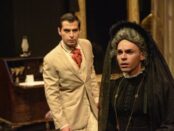La Viuda (The Widow)
María Irene Fornés’ rediscovered "La Viuda" is a valuable addition to her better known canon. It is a challenging play in that it is basically an 80-minute monologue with other characters in flashback occasionally interrupting Angela’s narration. Director Olga Sanchez Saltveit makes a fine case for this play with a spirited and lively production but she has not solved all of the play’s inherent problems. Performed in repertory with Sam Collier’s "A Hundred Circling Camps," "La Viuda' is a worthy part of Dogteam Theatre Project’s inaugural season. [more]






